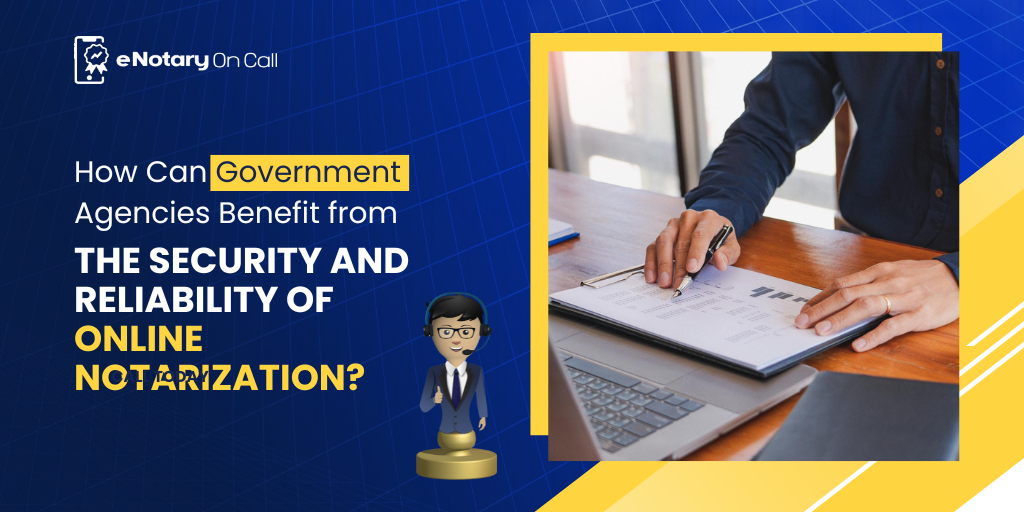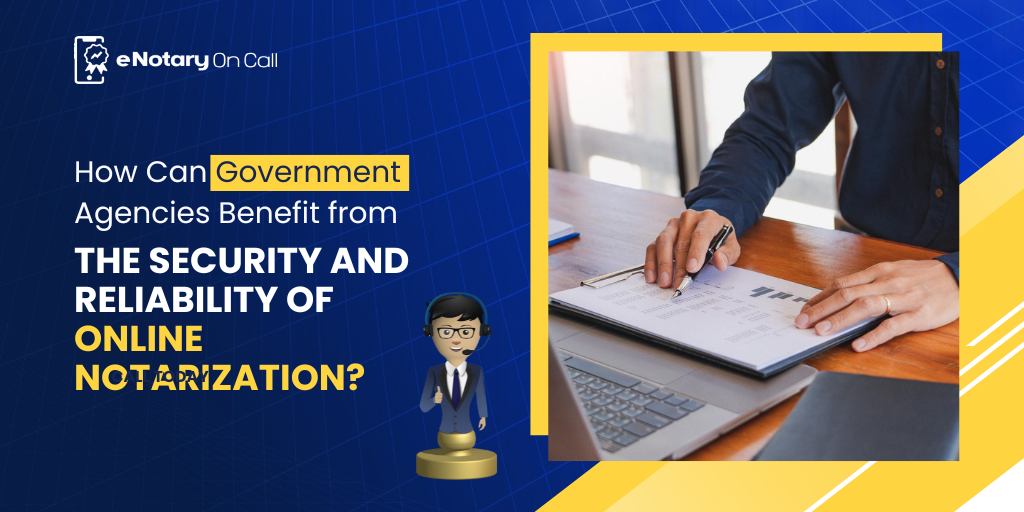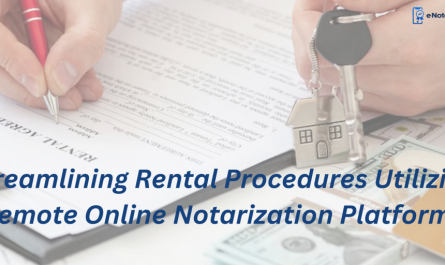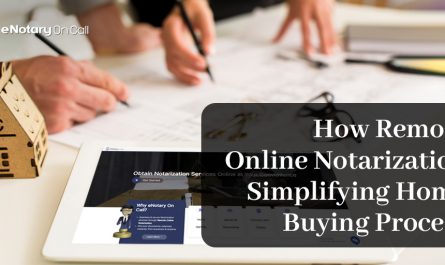
Did you know that as technology advances, many agencies including the government are adapting the benefits of online notarization? It allows for faster, more secure, and reliable processing of documents without the need to physically meet in person.
In fact, the COVID-19 pandemic has made online notarization even more crucial as agencies have started working remotely. This has led to a significant increase in the adoption of online notarization services. According to recent statistics by market and market, the use of online notarization in government sector has witnessed a staggering 200% increase during the pandemic.
This rise in adoption is not surprising considering the numerous advantages it offers. In this blog post, we’ll explore the benefits of online notarization specifically for government agencies.
What is online notarization and how does it work?
Online notarization is a process that allows a notary public to notarize documents remotely using a secure online platform. The notary public uses audio and video technology to confirm the identity of the signer, witness the signing of the document, and provide their digital signature and seal.
To begin the online notarization process:
- The signer simply uploads their document to the online notarization platform and completes an identity verification process.
- Once the identity is verified, the signer and notary public can meet virtually to complete the notarization.
- Once the notarization is complete, the notary public attaches their electronic signature and seal to the document before returning it to the signer.
Improved content
How Can Government Agencies Benefit from the Security and Reliability of Online Notarization?
Did you know that with advancing technology, more government organizations, including the government, are embracing the benefits of online notarization? This allows for faster, more secure, and reliable processing of documents without the need to meet in person.
In fact, the COVID-19 pandemic has made online notarization even more crucial as agencies have started working remotely. This has led to a significant increase in the adoption of online notarization services. According to recent statistics by the market, the use of online notarization in the government sector has witnessed a staggering 200% increase during the pandemic.
This rise in adoption is not surprising considering the numerous advantages it offers. In this blog post, we’ll explore the benefits of online notarization, specifically for government organizations.
What is online notarization and how does it work?
Online notarization is a process that allows a notary public to notarize documents remotely using a secure online platform, such as Notarize. The notary public uses audio and video technology to confirm the signer’s identity, witness the document signing, and provide their digital signature and seal.
To begin the online notarization process,
- The signer simply uploads their document to the online notarization platform and completes an identity verification process.
- Once the identity is verified, the signer and notary public can meet virtually to complete the notarization.
- Once the notarization is complete, the notary public attaches their electronic signature and seal to the document before returning it to the signer.
Here’s How Government Agencies Benefit from Online Notarization
Let’s take a look at some ways the online notarization process is helping government agencies.
Fortified Security Protocols: Safeguarding Government Documents
By incorporating advanced encryption, identity verification, and digital audit trails, online notarization serves as a bulwark against fraud and unauthorized alterations. For example, the use of cryptographic algorithms ensures that all documents are securely encrypted and protected from unauthorized access.
- Additionally, identity verification processes such as multi-factor authentication and biometric verification strengthen the security of online notarization platforms.
- The implementation of digital audit trails provides a comprehensive record of all actions taken during the notarization process, enabling traceability and accountability.
- These robust security measures offer a crucial layer of protection for official documents, ensuring that the integrity and authenticity of records are preserved.
Streamlined Workflows: Increasing Operational Efficiency
Government agencies often grapple with time-consuming processes and bureaucratic complexities. Through online notarization, these entities can alleviate the burden of physical presence requirements, facilitate remote access to notarization services, and achieve substantial time and cost savings.
- For instance, by enabling online document submission and electronic signature capabilities, government agencies can eliminate the need for individuals to travel to physical locations for notarization.
- This helps in reducing administrative overhead and accelerating document processing times.
- This streamlined approach enables enhanced operational efficiency, empowering agencies to focus on delivering essential services.
Citizen-Centric Accessibility: Maximizing Service Delivery
Online notarization embodies a pivotal shift towards increased accessibility and convenience for citizens, businesses, and government partners. By allowing individuals to notarize documents from any location, government agencies can facilitate faster turnaround times and drive greater satisfaction among stakeholders, ultimately enriching public trust and esteem.
- For example, a citizen seeking notarization can upload their documents to an online platform at any time, eliminating the need to schedule appointments or visit physical notary offices during limited business hours.
- This accessibility improves citizens’ efficiency and fosters a more inclusive environment for individuals with mobility challenges or those residing in remote areas.
Compliance Assurance: Meeting Regulatory Imperatives
Government agencies must adhere to stringent compliance and regulatory demands when authenticating documents. Online notarization platforms can be tailored to align with these specific standards, ensuring that notarized documents consistently meet legal requirements.
- For instance, regulatory frameworks such as the Uniform Electronic Transactions Act (UETA) and the Electronic Signatures in Global and National Commerce Act (ESIGN) establish guidelines for electronic document authentication, and online notarization platforms can be designed to comply with these laws.
- By using online notarization, government entities can fortify their commitment to upholding the highest regulatory standards.
Digital Integration: Advancing Government Digital Initiatives
The momentum toward digital transformation within government operations aligns seamlessly with the integration of online notarization. By aligning online notarization with digital systems, government agencies can improve their digital capabilities and speed up their overall digitalization efforts, creating a modern approach to verifying documents.
- For example, integration with digital document management systems allows for seamless transfer and storage of notarized documents in secure, electronically searchable formats.
- This integration enhances overall data management practices, reduces physical storage needs, and supports the broader digitization initiatives of government agencies.
Resilient Remote Services: Navigating Unforeseen Challenges
In a world marked by global events and the need for increased remote operations, online notarization’s adaptability to offer remote services assumes heightened significance. By using online platforms, government agencies can ensure continuity of operations, irrespective of location or in-person interaction, thereby fortifying their resilience in the face of unforeseen disruptions.
- For example, while in-person notarization may be impractical or unsafe during a natural disaster or public health emergency, online notarization allows firms to continue providing essential services without interruption.
- This adaptability increases the agency’s ability to respond to emergencies and maintain crucial public services.
Upholding Public Trust: Fostering Confidence in Official Documents
Adapting secure and reliable online notarization serves as a testament to a government agency’s unwavering commitment to maintaining unimpeachable standards of document authentication. Through this, agencies can fortify public trust and convey a steadfast dedication to preserving the reliability and authenticity of official records, fostering stronger relationships with citizens and stakeholders.
- For instance, by using online notarization platforms with robust security measures and compliance with industry best practices, government agencies can instill confidence in citizens that their documents are being handled securely and reliably.
Online notarization and government agencies: Final thoughts
As government agencies continue to improve their processes and provide better services, online notarization provides an opportunity to further improve efficiency, security, and reliability in document notarization.
By adopting online notarization, government agencies can better serve their constituents, improve their operational efficiency, and save time and resources.
If you’re looking for ways to improve processes and modernize services for your government agency, incorporating online notarization can have a significant impact. With eNotary On Call, your government agency can streamline online remote notarization processes and bring them into the digital age.
To learn more about how eNotary On Call can benefit your agency, feel free to visit our website or reach out to us directly.



